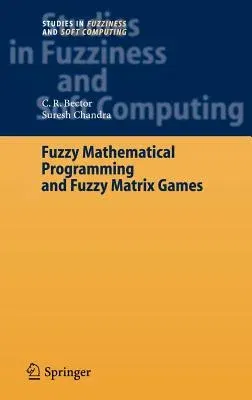C R Bector
(Author)Fuzzy Mathematical Programming and Fuzzy Matrix Games (2005)Hardcover - 2005, 19 January 2005

Qty
1
Turbo
Ships in 2 - 3 days
In Stock
Free Delivery
Cash on Delivery
15 Days
Free Returns
Secure Checkout

Part of Series
Studies in Fuzziness and Soft Computing
Print Length
236 pages
Language
English
Publisher
Springer
Date Published
19 Jan 2005
ISBN-10
3540237291
ISBN-13
9783540237297
Description
Product Details
Authors:
Book Edition:
2005
Book Format:
Hardcover
Country of Origin:
US
Date Published:
19 January 2005
Dimensions:
23.39 x
15.6 x
1.6 cm
ISBN-10:
3540237291
ISBN-13:
9783540237297
Language:
English
Location:
Berlin, Heidelberg
Pages:
236
Publisher:
Weight:
530.7 gm